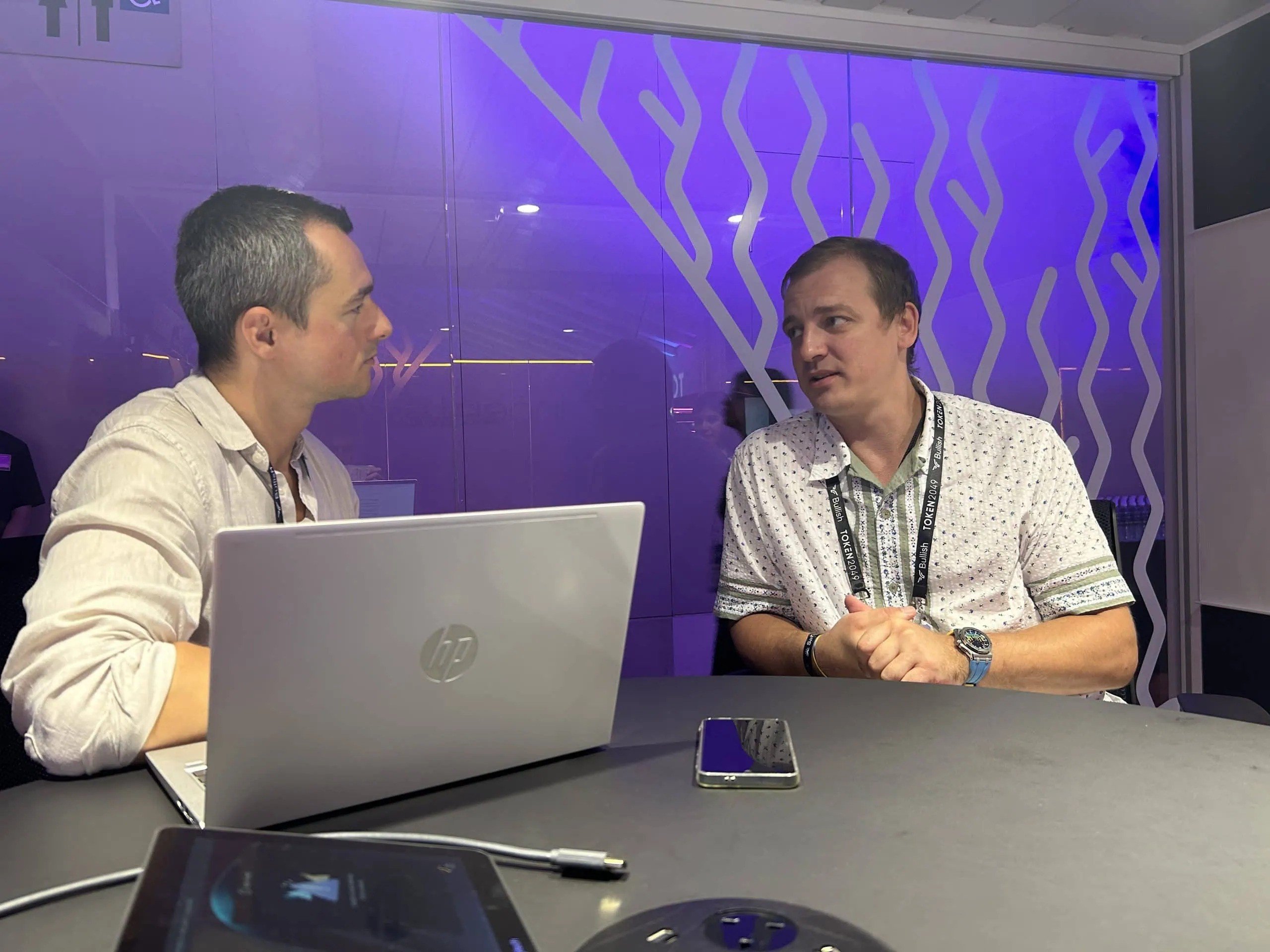WhiteBIT CEO: Standing Strong Against Russian Aggression

In an interview with BTC-ECHO, Volodymyr Nosov, the founder and CEO of WhiteBIT, discussed the impact of Russian aggression on the crypto exchange's business, how WhiteBIT stays a top competitor in the industry, and when he believes our financial system will be completely transformed.

Image by BTC-ECHO | In an interview, WhiteBIT CEO Volodymyr Nosov (right) answers questions from editor-in-chief Sven Wagenknecht (left)
But there’s something more impressive: The crypto exchange hailing from Ukraine has been standing strong against the Russian war of aggression while achieving remarkable growth over the past two years. Its founder and CEO, Volodymyr Nosov, is determined to continue this path and to further align the company towards Europe. He revealed exactly how in an interview with BTC-ECHO at Token2049 in Singapore.
BTC-ECHO: WhiteBIT is based in Ukraine. How has the Russian war of aggression affected your company?
Volodymyr Nosov: I’m originally from Ukraine, and most of our team is also from Ukraine. We have an office in Kharkiv, a city just 35 kilometers from the Russian border. When the war started, we ended all business relations with Russia - no registrations, no payments in rubles. We are one of the few exchanges that have fully enforced this.
Since then, our focus has been entirely on Europe. Although we come from Ukraine, Europe is also our home. Today, we have 1,100 employees from different countries and ten offices worldwide.
Where do you see the greatest growth for your company?
We mainly focus on the technical development of our products and building B2B partnerships. Once we establish these connections, we start collaborating with larger fintech, banking, and telecom companies. This approach has allowed us to expand into new regions like Australia, Georgia, the UK, and Turkey. However, Europe remains our primary market, and we continue to grow across various European countries.
We mainly focus on the technical development of our products and building B2B partnerships. Once we establish these connections, we start collaborating with larger fintech, banking, and telecom companies. This approach has allowed us to expand into new regions like Australia, Georgia, the UK, and Turkey. However, Europe remains our primary market, and we continue to grow across various European countries.
Are you planning to apply for a MICA license?
Yes, we currently operate with various licenses in Europe, including Spain, Lithuania, Czech Republic, and Poland. We are preparing for the MICA era, which will start in 2025, and plan to offer our services across Europe. For crypto exchanges, MiCA will work like an EU passport. Once you meet all the requirements for MiCA in one region, you can operate in 27 countries. We are also working on licenses in Dubai, Turkey and soon in the UK and Switzerland.
Which products do you particularly focus on?
We specialize in blockchain development, with our flagship product WhiteBIT leading the way. It has achieved remarkable results, with over $1 trillion in trading volume in the spot and futures markets in 2024, more than 5.5 million customers, and over 1,000 B2B partners.
In addition to WhiteBIT, we offer services such as Whitepay for payments, WhiteEX for recharge cards, and trading White Market CS2 skins. We also have a bank in Georgia that offers crypto card solutions. Our vision is to simplify the adoption of new financial technologies for Web2 businesses such as marketplaces, telcos, banks, etc. We provide comprehensive backend solutions and APIs so that clients can focus on their front end while we take care of the technology. By partnering with established institutions, we help them offer innovative services to their clients so that people can more easily adopt new technologies without having to completely change their habits.
How long do you think it will take for new technologies to be adopted?
We are currently in a phase where the old money is turning into the new money. The old financial system is turning into the new financial system. Important developments are starting in the US with exchange-traded funds and regulatory changes, as well as in the EU. Given this dynamic, it will probably take about another two years before the new technologies are integrated on a large scale. By 2030, the entire financial system will look different.
What do you think about the role of institutional investors?
Institutional investors are important for the entire industry. The "old" financial systems are changing, and institutions are often the decision-makers. The next generation will be more concerned with transparency and verifiable evidence, and Bitcoin is an example of this, with 15 years of international scrutiny.
How do you see the crypto market in the next six to twelve months?
Statistically, the market goes into an uptrend after 180 days after the halving. I expect the market to go up again in the next six to twelve months and we may reach new highs.
Would you like to add anything else?
Yes, I would like to express my thanks to Germany. Your country and your government have done a lot for the Ukrainian people. That means a lot to me and to us. Thank you very much!
Recommended

